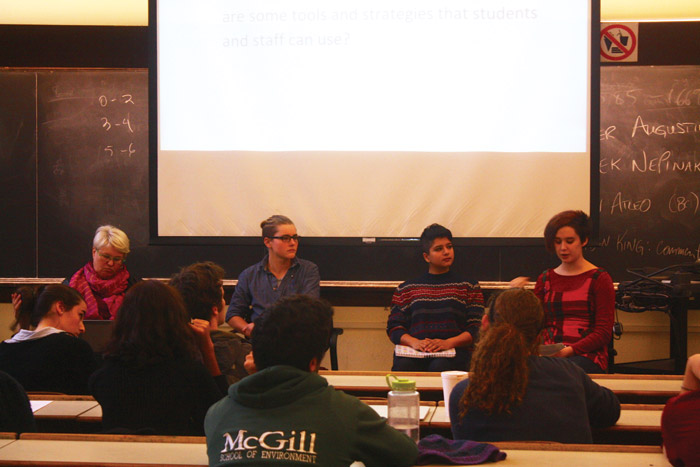Students hosted a panel discussion on “Building a Culture of Consent on Campus” last Thursday as part of #ConsentMcGill, a week-long event organized and run by McGill students and administration. The panel responded to broad questions relating to the idea of a consent culture before opening up discussion with the audience of about 30 students. #ConsentMcGill was a campaign during Consent Week that sought to educate and increase campus awareness of consent in not only sexual activity, but also as it applies to students’ daily lives. The week included workshops on different aspects of consent and inclusivity on campus, as well as booths providing information to students.
The panel comprised of Alice Gauntley, U2 Arts; Roma Nadeem, U2 Arts; and Jean Murray, U3 Arts, as well as Carrie Rentschler, Director for the Institute for Gender, Sexuality and Feminist Studies (IGSF). The first panel question asked what a culture of consent on campus would look like.
Gauntley stressed the importance of consent in all aspects of students life, citing social activities that may be undesired such as drinking.
“A consent culture should apply in all of our social relationships on a campus, and when that happens on a campus that creates a ripple effect in the larger community,” she said. “ In a culture of consent, we no longer think it’s okay to pressure our friends, to pressure our froshies into drinking more than they want to. I feel like a culture of consent removes the social acceptance behind any manipulative behaviors.”
One discussion question asked how a culture of consent on campus would address issues of sexual violence in the community and beyond McGill. In response, Murray commented that the community is created by the arbitrary merging of many diffuse communities.
“Everybody who comes here was almost certainly raised in a context of normalized gender and […] sexual-based violence,” Murray said. “We must work to create a new collaborative setting where this is not the case through a lot of education and a complete paradigm shift in the immediate community as well as [in]the surrounding area.”
Rentschler brought up the issue of how a large number of sexual assaults on campus are performed by a small number of people, and that a strong consent culture may not help as much in this regard.
“Does this prevent the small group of people who are doing most sexual assault on campus from doing what they do?” Rentschler questioned. “I’m not sure it does. So then there’s the question of how do we mobilize this way of thinking into a convention strategy that actually says ‘This has to stop.’ If we can’t do this through training on how to consent in a relationship, then we need an alternative strategy for doing that as well. I think we build off of this consent culture to do that.”
Murray agreed and gave examples of action which have already been taken, such as including sexual assault education in frosh leader and server training.
“This needs to be an institutional change, it needs to be more than a group of people talking in a classroom,” she said.
Another question raised what advice the panelists could give for cultivating consent on campus, Nadeem said that although most of the focus is on large-scale campaigns, there are individual person-to-person changes people can make to enhance consent on campus and to normalize this amongst young people.
“[Things] such as bodily autonomy [and] asking people if you can give them a hug,” Nadeem listed as examples of ways to enhance consent. “Things like asking a friend if it’s okay to vent to them, if they’re in a good space to hear you rant.”
Murray emphasized the importance of active listening.
“Active listening is huge and it is one of the best things you can do to help people,” she said.
Rentschler said that ideally, people should take responsibility for mistakes or correcting others as a form of education, not shaming.
“We all need to learn how to do this and continue learning,” Rentschler said. “I see consent as a constant process and [….] It’s about ways of being responsive, so if you do do something you should not, you know how to respond.”
A final question asked what the role of accountability is in this possible culture. Gauntley affirmed that everyone is accountable for promoting a culture of consent.
“We are all accountable […] not to perpetuate a culture where consent is not present […] and to find ways to bring it into our lives by offering support for friends,” she said. “It is important that we are all accountable for each other in this culture that we are developing.”
Murray agreed with this sentiment but further emphasized that in the context of McGill hierarchy, more responsibility would lie on those in positions of power.
Following the organized questions, audience members began a dialogue on related topics such as the difficulties involved in holding perpetrators of sexual violence accountable, and how to prevent barriers to access within a culture of consent. The back and forth between panelists and audience members exhibited the interest and understanding developed from this event. Another lesson audience members agreed upon was that being safe is more important than being comfortable, and sometimes having difficult conversations is necessary if it can prevent future violence.









